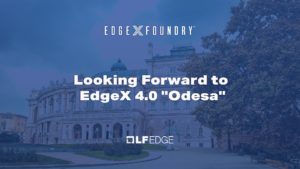Looking Forward to EdgeX 4.0: Industrial Readiness and Open-Source Licensing Integrity
By James Butcher, EdgeX Foundry Chairman and IOTech Systems Product Manager
As EdgeX Foundry prepares to launch its 4.0 “Odesa” release, this latest milestone reflects not only technical innovation but also a reaffirmation of the project’s commitment to open-source principles.
Alongside some key new features for industrial edge deployments, the project has strategically replaced some key components of the framework that have recently undergone licensing changes. This decision reinforces the project’s unwavering commitment to maintaining a truly open and vendor-neutral edge computing platform.

What is EdgeX Foundry?
EdgeX Foundry is a leading open-source framework for edge computing that enables seamless integration between IoT devices, sensors, and applications. It provides a microservices-based architecture, empowering developers to create scalable and adaptable solutions while avoiding vendor lock-in. With millions of downloads and adoption across industries such as manufacturing, energy, building automation and transportation, EdgeX has become a cornerstone of modern industrial IoT edge systems.
Why Licensing Matters in Open Source?
EdgeX Foundry operates under the Apache 2.0 license, a permissive and widely accepted standard in the open-source community. The decision to replace components that no longer align with this model reflects the project’s dedication to fostering trust and collaboration. We know open-source projects thrive on transparency and consistency, and so we felt ensuring compatibility within the base framework is critical to maintaining developer confidence and ecosystem growth.
The Significance of EdgeX 4.0
As a microservices framework, EdgeX relies on many third-party service components to support key features such as data persistence, internal messaging, service configuration and registration, and secret storage.
EdgeX 4.0 will replace the services that moved away from Apache 2.0 compatible licensing, and we’ll switch to use new third-party services for these roles. In particular, the Linux Foundation’s OpenBao and Valkey projects are included as replacements for Vault and Redis, respectively. In addition, EdgeX 4.0 is switching to PostgreSQL as the main internal database, and MQTT as the internal message bus.
Crucially EdgeX V4 will not change the external APIs used at V3, so it will be straightforward for users to make the switch and benefit from these updates.
This licensing-driven component swap is not just a technical change – it’s evidence of the project’s core values. For developers and businesses, it provides clarity and assurance that they can continue building on EdgeX with full confidence in its open-source integrity.
Robustness and Industrial Readiness
The introduction of PostgreSQL as the internal database also brings important capabilities needed for industrial-ready edge systems. PostgreSQL is well known for its robustness and is better placed to support key needs such as backup, redundancy, recovery, and so on, helping to ensure EdgeX can meet the needs of enterprise-scale industrial edge systems.
In response to user feedback, the upcoming EdgeX release also introduces precise Time-Based Scheduling for edge operations – an essential feature for industrial systems requiring strict timing. This enhancement replaces the previous interval-based approach, offering greater flexibility and control.
Other exciting new features will include the first end-to-end authentication for EdgeX services, leveraging Zero-Trust Networking principles, and a brand-new Python API that will make EdgeX accessible to a whole new community of developers and new use cases. More details on these exciting new features will be shared soon.
Available in February 2025
As businesses increasingly rely on open platforms to manage their edge and IoT systems, EdgeX Foundry’s proactive stance on licensing solidifies its position as a trusted leader in the field. The EdgeX 4.0 “Odesa” release that we have planned for February 2025 ensures that EdgeX remains a secure, interoperable, and truly open foundation for edge computing.
Stay tuned for the official launch and further details from the EdgeX Foundry team. In the meantime, visit the EdgeX Foundry website, Odesa release page and follow the EdgeX LinkedIn page.